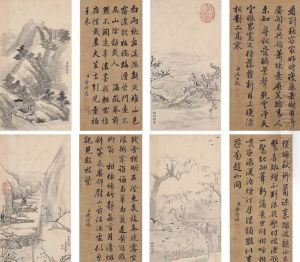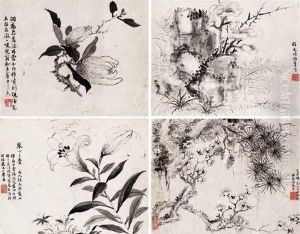Zhang Ruocheng Paintings
Zhang Ruocheng was a Chinese scholar, poet, and painter of the Qing dynasty, which was the last imperial dynasty of China, lasting from 1644 to 1912. Born in 1722, Zhang lived through the reign of the Qianlong Emperor, who is often remembered for his patronage of the arts and for presiding over a period of expansion and prosperity in China.
Zhang Ruocheng's contributions to Chinese literature and art were significant, although he may not be as widely recognized as some of his contemporaries. As a scholar, he was well-versed in the Confucian classics and Chinese literature, which greatly influenced his work as a poet and painter. His poetry often reflected the values and aesthetics of literati culture, emphasizing themes of nature, solitude, and introspection. These themes were also present in his painting, where he would have employed the traditional Chinese techniques of brush and ink on paper or silk, aligning with the literati artistic ideals of personal expression and scholarly refinement.
Despite his talents, much of Zhang Ruocheng's life remains obscure, and specific details about his career and influence are scarce. His death in 1770 marked the end of a relatively short life, during which he would have navigated the complex social and political landscapes of Qing-dynasty China. What remains of his work continues to offer insights into the literati culture of his time and contributes to the rich tapestry of Chinese art history.
Zhang Ruocheng's artistic legacy would have been preserved through various means, including private collections, imperial archives, and possibly through his students or followers who continued his artistic traditions. While his name may not be as well-known as other figures from his era, his surviving works would be of interest to scholars and connoisseurs of Qing dynasty art and literature, offering a window into the world of an 18th-century Chinese intellectual and artist.

